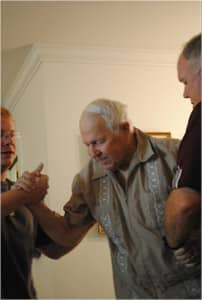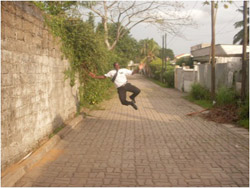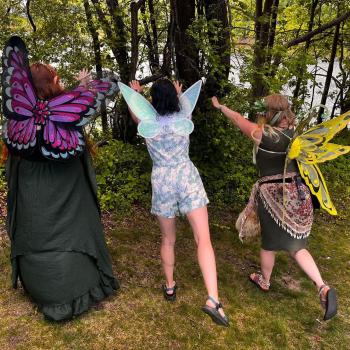There is an "impossible dream" in The Book of Mormon Musical, too, though not an inspiring one. In fact, it's quite the opposite of the Quixotic illusion. "Spooky Mormon Hell dream" shows the missionaries encumbered by their own and others' absurd expectations, laden with shame, supposing they have been revealed as "unworthy" and then tormented by medieval devils, who come complete with horns and pitchforks. (Devils in real Mormonism are much more subtle and sly.)
Of course, as good satirists, Parker and Stone have identified the Mormon proclivity toward guilt as a fruitful subject for humor. In "Spooky Mormon Hell Dream," the missionaries are haunted by memories of petty misdeeds from their childhoods, and dream that Jesus hates them and denounces them with a vulgar epithet. Tyrannical fathers rise from the sludge of memory to ground them for stealing donuts—or breaking one of several hundred missionary rules.
 |
| Robert Blair being supported by his son and grandson |
"Spooky Mormon Hell Dream" is the perfect counterpoint to "I Believe." In the latter, there is no hierarchy of central and subordinate/irrelevant/false doctrine. In the Hell dream, there is no hierarchy of misdeeds. Stealing a donut and them blaming it on your brother is tantamount to committing genocide in Nazi Germany.
In Mormonism as we actually live it, things are far more complex and full of promise. We do burden ourselves with guilt, but we are not unique in that. More important is the fact that we undertake impossible dreams—such as making missionaries of teenagers and sending them to places like Africa. In the best of times, and when we are living our religion, our dreams are magnificent and overflowing with love and compassion—including toward ourselves. And often (more often than we recognize), those dreams come true.
Chiloba Chirwa, a knight of radiant countenance, dreamed big, and had sweet memories of the father he would never see again in mortality. "Before my mission, I overheard a telephone conversation between my dad and mum," he said. "She asked him if he felt I should go on my mission, and he replied 'I think he has done well enough to go.' I always knew that he supported what I was doing."
I had a dream once that I was about to meet Chiloba Chirwa. He was just turning to look at me, but then disappeared as I awoke. But though I have never met him, I have heard from those who know him well that no photograph does him justice. He (no doubt like his father) is far more handsome than a camera can reveal.
 |
| Elder Chirwa kicking his heels |
Miraculously, my father survived the crisis and lived to celebrate his 80th birthday with his family. All of my siblings had flown in for this, uncertain if we would be eating a birthday cake or planning a funeral. At 2:00 p.m. on his birthday, supported by a son and a grandson, Dad walked into his own home.
I was not yet called upon to endure the loss of my father, as Chiloba had done. But the realization that I had "been there" for him—that I had been alerted to his loss so that my words were waiting when he was able to access a computer; that I had interviewed Jacob before he died and thus could give Chiloba his father's own words; that I had met Chiloba's mother and sister—appeared miraculous. As so often happens, we find ourselves at the intersections of each other's lives at just the right moment, tooled in ways we had not heretofore understood. We become angels for one another. That's the real Mormon dream.




